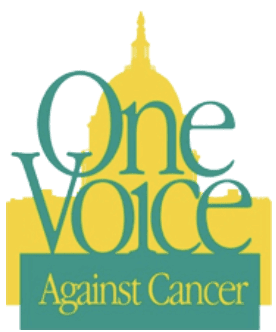This year the COVID-19 pandemic has Washington DC on lockdown and the OVAC Lobby Day was held virtually.
 One Voice Against Cancer (OVAC) began in January 2000 as a working group of public health organizations advocating for greater federal investments in cancer research. OVAC has grown into the leading cancer coalition in the nation’s capital representing millions of cancer researchers, physicians, nurses, patients, survivors, and their families – a collaboration of national non-profit organizations representing millions of Americans, delivering a unified message to Congress and the White House on the need for increased cancer-related appropriations.
One Voice Against Cancer (OVAC) began in January 2000 as a working group of public health organizations advocating for greater federal investments in cancer research. OVAC has grown into the leading cancer coalition in the nation’s capital representing millions of cancer researchers, physicians, nurses, patients, survivors, and their families – a collaboration of national non-profit organizations representing millions of Americans, delivering a unified message to Congress and the White House on the need for increased cancer-related appropriations.
Virtual Lobby Day Requests, May 19, 2020
Summary:
COVID-19 is of course the biggest health challenge the world faces right now. But even in a pandemic, Americans are being diagnosed with cancer. Yes, we must restart cancer research & clinical trials to ensure that we do not lose any progress. However, Congress must also ensure that we have long-term, sustained funding increases for cancer research and prevention in the regular budget process.
One Voice Against Cancer (OVAC) is urging Congress to:
1. Support $10 billion for the National Institutes of Health (NIH) to jumpstart COVID19 impacted research in the next emergency supplemental funding bill.
2. Support at least $44.7 billion (a $3 billion increase) for NIH in FY2021 including $6.9 billion for cancer research at the National Cancer Institute (NCI).
3. Support $559 million for the Centers of Disease Control and Prevention’s (CDC) cancer programs, including $70 million ($19 million increase) for cancer registries, in the FY2021 funding bill.
ASK #1: NIH Key in the fight against COVID-19 and cancer
• Obviously, COVID-19 has upended our entire society including research funded by the National Institutes of Health (NIH) and the National Cancer Institute (NCI). The impact of this pandemic on the entire biomedical research ecosystem, including cancer, is severe and relief is needed to ensure that labs and researchers can restart their operations. Specifically, when cancer patients lose access to clinical trials that are halted or delayed
because of COVID-19, they are losing a vital part of their cancer care and treatment.
• We are grateful that the House of Representatives included $3 billion to restart research and clinical trials in their recently passed CARES 2.0 package. However, NIH director Francis Collins testified recently that the agency stands to lose $10 billion worth of research as a result of the pandemic.
We urge Congress to include at least $10 billion to help research and clinical trials to get back on track.
ASK #2: Increase Funding for NIH in FY2021 including an increase for NCI
• First, we are so grateful for the bipartisan support for NIH and the NCI of the last five years. Because of these past increases, medical research at the NIH and cancer research at the NCI are back on the path of promise and discovery.
• Our nation’s fast-growing cancer burden demands sustained increases in federal investment, even in moments of crisis. Even before COVID-19 crisis, a historic number of possible cancer breakthroughs were being left on the shelf. Cancer research is one of science’s most dynamic areas-NCI is unable to fund hundreds of high-quality research applications every year.
• Without continued increases in funding, we risk losing a generation of young investigators, slowing progress and threatening American competitiveness. To maintain the pace of progress and discovery, Congress must provide long-term, sustained, funding increases.
We urge Congress to include at least $44.7 billion (a $3 billion increase) for NIH in FY2021 including $6.9 billion for cancer research at the National Cancer Institute (NCI).
ASK #3: Increase Funding for CDC’s cancer programs including cancer registries in FY2021
• CDC cancer control programs are a lifeline to people who would otherwise go without cancer screening in all fifty states. Literally saving lives in the process. Nearly half of cancer cases can be prevented and the substantial cost of the treatment of advanced disease could be reduced through the use of existing evidence based programs addressing breast, cervical, colorectal, survivorship, and cancer registries. All of these programs should see a funding increase but I wanted to get into a little more detail about cancer registries at CDC.
• Cancer registries are critical in the fight against cancer. They provide a national searchable database of cancer patients and the treatments they receive. Unfortunately, there is a 24- month lag between when data is collected and when it is available for researchers. This means that important studies that monitor the burden of disease or treatment efficacy are delayed.
• Increased funding will modernize the current system of data capturing to collect data in real-time which will identify new trends as they happen and improve cancer research, public health interventions, and treatment protocols.
We urge Congress to include $559 million for the Centers of Disease Control and Prevention cancer programs, including $70 million ($19 million increase) for cancer registries, in the FY2021 funding bill.




